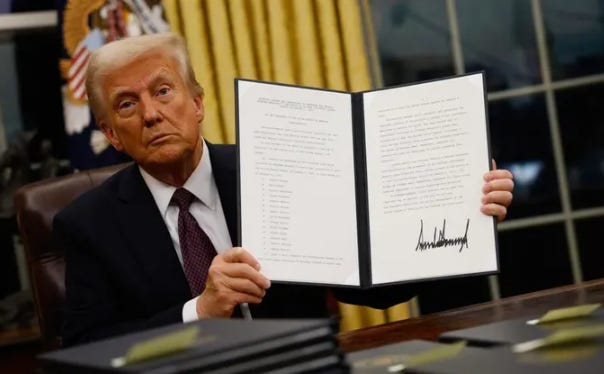Face First
Crypto to pay off the national debt, lower interest rates during a fight against inflation and stocks at record high valuations. Hold on to your nuts.
In a couple of my previous articles, I pointed out that I thought cryptocurrency would wind up being the canary in the coal mine as it relates to the next stock market crash.
And by the looks of things, the warning signals may not be as difficult to take notice of as I once thought. I wish that was because more people were simply paying attention, but it’s not. It’s because the United States seems to be heading face-first into the crypto business, so it’ll be on every single person’s radar.
Since his inauguration, President Donald Trump has taken bold steps to position the United States as a leader in the cryptocurrency industry. One of his first actions was signing an executive order titled "Strengthening American Leadership in Digital Financial Technology," aimed at fostering innovation while ensuring regulatory clarity in the crypto space. The order outlines protections for public blockchain networks, encourages the development of U.S. dollar-backed stablecoins, and explicitly prohibits the creation of a central bank digital currency (CBDC). To support this effort, a Presidential Task Force on Digital Asset Markets, led by venture capitalist David Sacks, has been established to draft regulatory proposals.
In addition to regulatory measures, President Trump has introduced a strategic initiative to create a national Bitcoin reserve. This plan involves the U.S. government accumulating Bitcoin, either through direct acquisitions or by utilizing cryptocurrency seized from criminal enterprises. The reserve is intended to strengthen the nation's financial standing in a global economy increasingly influenced by digital assets.
Trump has also repeatedly called for the U.S. to embrace its role as the "crypto capital of the world," emphasizing the importance of fostering innovation and providing a clear regulatory environment to attract investment and talent.
And now, the only question is whether or not this is an asset class that will actually serve a purpose over the long haul. As a result, will we just have to wait for the poor investments in the space to be flushed out—or, in the event that crypto turns out to be a big nothing—will we have to wait for the entire asset class to implode?



